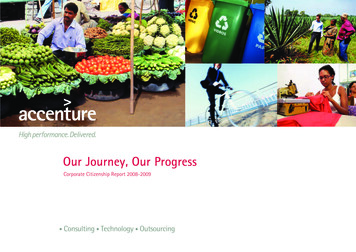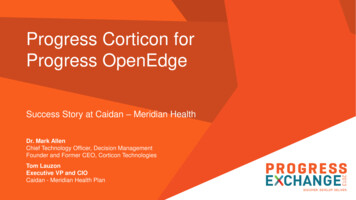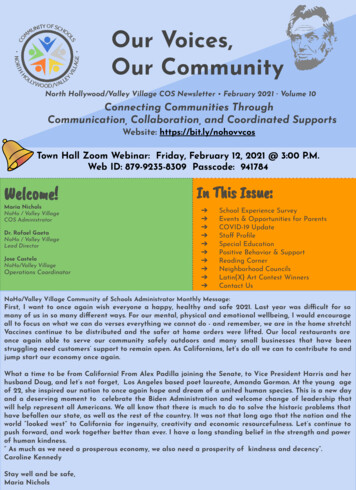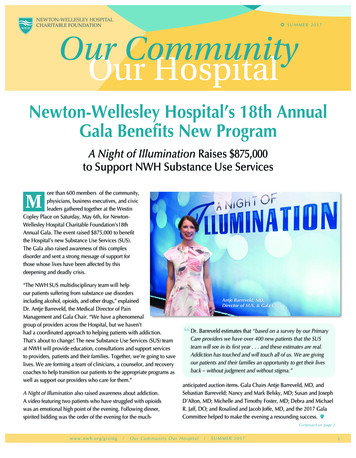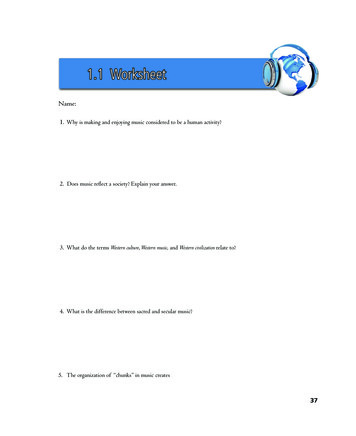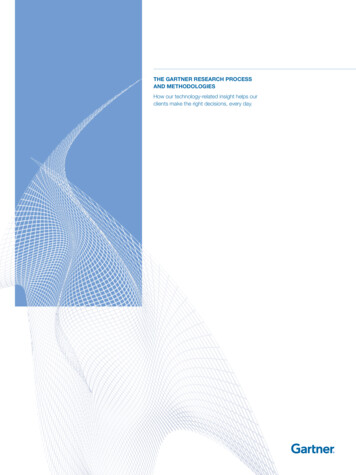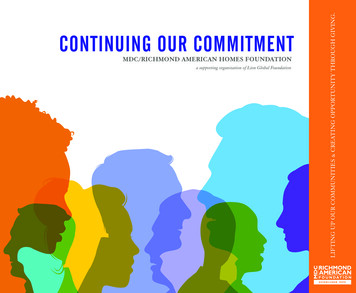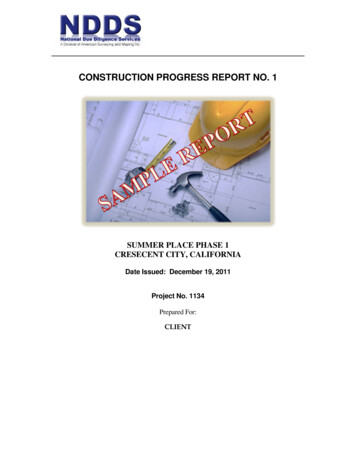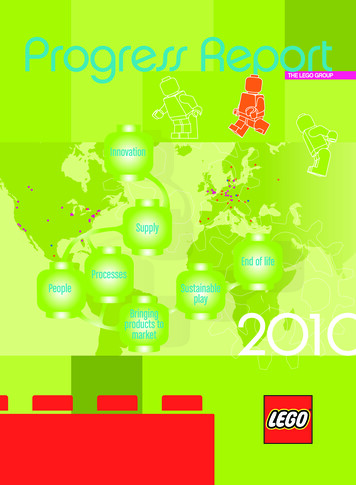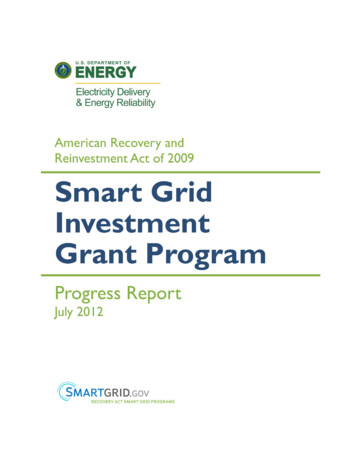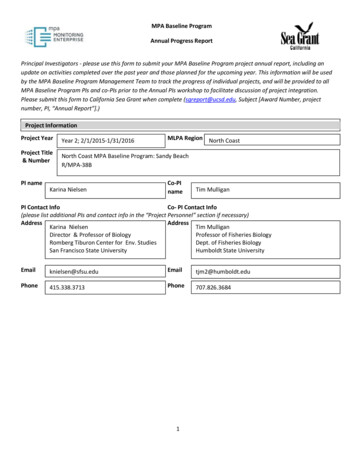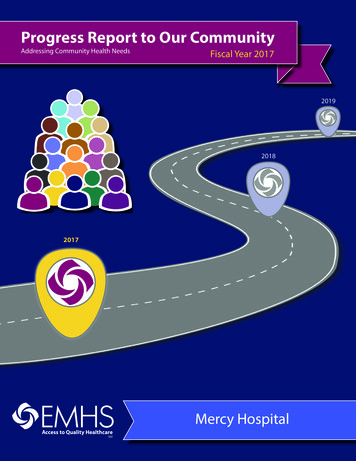
Transcription
Progress Report to Our CommunityAddressing Community Health NeedsFiscal Year 2017201920182017Mercy Hospital
Table of ContentsProgress Report to Our Community. 3Introduction. 3Progress Report Update.Priority #1: Substance Abuse Treatment.Priority #2: Affordable Housing and Homelessness.Priority #3: Medical Neighborhood.Priority #4: Preventive Screenings and Immunizations.Priority #5: Enrollment Activities and Coverage Counseling.Priority #6: Health Education.Systemwide Priority - Opioid Harm Reduction.Systemwide Priority - Healthy Food Access.448111315171927Conclusion. 33Mercy Hospital, 175 Fore River Parkway, Portland, Maine 041022
Progress Report to Our CommunityCharlie TherrienPresident, Mercy HospitalMaking our communities healthier - It may sound like a simple goal, but doing it right,involves hard work, commitment, and collaboration. Many factors can influence the healthof people in our communities including income, poverty, employment, education, andhousehold environment.In 2016, EMHS partnered with three other large healthcare systems and the Maine Center for Disease Controland Prevention, an office of the Maine Department of Health and Human Services, to create a CommunityHealth Needs Assessment. We used that assessment and public input to develop a three-year strategy to improvethe health and well-being of the communities that we serve.The following is a progress report for our community health improvement plan for fiscal year 2017. As a memberorganization of EMHS, we at Mercy Hospital have our own unique set of priorities that we areaddressing including: Substance Abuse TreatmentAffordable Housing and HomelessnessMedical NeighborhoodPreventive Screenings and ImmunizationsEnrollment Activities and Coverage CounselingHealth EducationWe are also working together with other EMHS members throughout the state to prevent and treat opioidaddiction and to improve access to healthy food for patients, families and communities.The information contained in the following pages demonstrates our commitment to our communities and showthe steps we have taken to reach our benchmarks. Thank you for taking the time to review these materials.We appreciate and value your partnership in this endeavor. Together we are achieving success and supportingvibrant and healthy communities across the regions where we work and serve.Sincerely,Charlie TherrienPresident, Mercy Hospital3
Progress Report UpdatePriority #1:Substance Abuse TreatmentRationale:The goal is to create a successful integrated and comprehensive substance abuse treatment model for theGreater Portland community.Intended action to address the need:In June 2015, Mercy Hospital moved Partial Hospitalization and Intensive Outpatient Services to the StateStreet Campus and closed the Recovery Center in Westbrook. Melissa Skahan, Vice President of MissionIntegration at Mercy Hospital, convened the Greater Portland Addiction Collaborative (GPAC) steeringcommittee to build capacity for addiction treatment in Greater Portland. GPAC focuses on four keygoals: the effective use of existing resources, lowering cost while increasing the availability of high qualitytreatment, filling the gaps by expanding the continuum, and ensuring accountability for services delivered.At a series of three meetings from December 2015 through February 2016, GPAC outlined Portland’sunmet need for addiction services for uninsured or under-insured persons; developed a comprehensive,low-cost model to meet that need; and determined the cost, funding strategy, accountability, andgovernance required for success.Programs and resource allocation:Mercy Hospital has agreed to serve as the backbone organization to ensure integration and optimizationof the collaborative model. GPAC participants agreed upon a collaborative model for addiction services.Highlights of each partner’s role are as follows: Portland Police Department: PPD hired a Substance Abuse liaison to refer residents in need ofservice to the addiction collaborative and provide those residents ongoing support, saving on high-costincarceration. This clinician responds with police officers to all overdoses and works closely with streetoutreach and all providers. The Opportunity Alliance: This team of professional mobile outreach clinicians responds aroundthe-clock to crises and refer clients to the collaborative, working with hospitals, EMS, and police,promoting greater engagement in treatment and services. Milestone Recovery: Milestone Recovery offers emergency shelter, medically managed detoxificationand long-term treatment. Their detoxification center will add bed capacity and additional nursing staffin an effort to serve more uninsured persons. The Homeless Mobile Outreach Team provides criticalstreet outreach and transport for much of the target population. Portland Recovery Community Center (PRCC): PRCC offers healthy community and peer supportto individuals seeking varied recovery pathways. Sustained peer support for all participants beginningat detox, including individual and group recovery support and coaching, at Milestone and instructuredsober housing, will be offered. Amistad: Peer Coaching Initiative provides daily intentional peer support and provides the oversight inthe GPAC structured sober housing.4
Progress Report Update continued Community Housing of Maine (CHOM): is the largest provider of supportive housing in Maine. Theywill develop four properties for structured sober living for a total of 48 beds in year one, to reducelength of stay in detoxification without requiring housing assistance. Preble Street Services: Outreach and case management staff from Preble Street serve homelessindividuals in and out of shelter: veterans, trafficking victims, youth, and tenant/families in a number ofsites in Greater Portland. Catholic Charities: provides intensive outpatient, medication assisted treatment, and ongoingcounseling in a lower cost community-based setting. Catholic Charities will add clinical staff andadditional slots into intensive outpatient to serve more uninsured. Integrated Addiction Services of Mercy Hospital, Maine Health and Greater Portland Health: Allproviders will integrate addiction services into their primary care program to expand services andmedication assisted treatment.Planned collaborations:Drawing on Portland’s strength as a small city where people know and trust one another, the collaborativealigns the efforts of the following organizations currently addressing the opioid crisis: Mercy Hospital,Milestone Recovery, Portland Community Health Center, Catholic Charities of Maine, Portland RecoveryCommunity Center, The Opportunity Alliance, Portland Police Department, The City of Portland, MaineMedical Center, Amistad, Preble Street, and Community Housing of Maine.Population of focus:Treatment model for the Greater Portland community5
Progress Report Update continuedObjectiveStatusFY 2017 Progress ReportPriority 1: Substance Abuse TreatmentBy the end of FY17, we will reduce the number of uninsured persons declined accessto substance use disorder treatment by 50% through optimization of existing assetsand expansion of treatment, recovery-oriented services, and concrete supports such ashousing and employment services.In ProgressIn fiscal year 2017 (FY17), capacity-building was underway with community basedorganizations, with data scientists and engineers from Open Lattice creating anintegrated data platform, accessible by all stakeholders, with real-time notifications ofcritical activities that influence recovery outcomes. Open Lattice and Greater PortlandAddiction Collaborative (GPAC) partners began work in the summer and fall to developelectronic client records, a master person index, and integrate data from police, jail, andother partner organizations. This requires new work-flows and partners to migrate frompaper documentation to a new electronic client record that will be shared through theelectronic platform. A demo of the integrated platform will be available in December of2017 (FY18).GPAC will evaluate data collection and sharing, work-flows, real-time alerts, andreporting functions, analyzing outcomes compared to systemic performance standardsApproaches taken and identifying the interventions and recovery pathways that produce desired outcomes.We will test the impact of real-time notifications to drive response and care delivery andand resourcescreate performance evaluation tools across organizations. Testing and refinement will byusedongoing. GPAC will seek an evaluator to develop a rigorous evaluation to assess programand achievement of recovery outcomes. Evaluation measures will be set up in a way thatanticipates the requirements of a Pay For Success transaction. Evaluation outcomes willbe shared broadly. Quantified Ventures will complete a feasibility study to determinewhether specific interventions produce outcomes that could be appropriate for a PFScontract. Mercy Hospital submitted a proposal for technical assistance from UrbanInstitute for evaluation structuring and data analysis. The GPAC Steering Committeefacilitated by Melissa Skahan, VP of Mission met weekly to finalize and adopt operatingprocedures. A practice council with membership from several organizations met andprovided input for practice standards in the GPAC house. The first recovery residencehas eight women residing with on-site support offered by a program manager, housemanager, and peer support. All are engaged with medication assisted treatment andvarious wrap around services.Mercy Hospital partnered with the following entities on this priority:Mercy Hospital, Milestone Recovery, The Opportunity Alliance, Portland Police,City of Portland, Community Housing of Maine, Amistad, Portland RecoveryCommunity Center, Greater Portland Health, Catholic Charities, Maine Health andPreble Street. National partners include Nonprofit Finance Fund, Urban Institute,Open Lattice, and Laura and John Arnold Foundation. Mercy Hospital submittedPartners engagedproposals to Urban Institute, and Bloomberg Foundation on behalf of the City ofPortland for technical assistance and funding. Maine’s Department of Correctionsand Department of Health and Human Services have offered letters of supportto serve as payors in anew financial model. Quantified Ventures remains ourintermediary firm to structure a financial transaction.6
Progress Report Update continuedFY 2017 Progress ReportPriority 1: Substance Abuse Treatment continuedA critical commitment of GPAC is to optimize existing assets. The early work of OpenLattice’s software engineers and data scientists will help to achieve that goal. Partnerorganizations – primarily community-based organizations - will migrate from paperprocesses and develop new work-flows guided by experts. Melissa Skahan serves onUrban Institute’s Community of Practice and GPAC was invited to apply for technicalassistance. This presented a remarkable opportunity to have national policy and practiceHighlightsexperts from D.C. to come to Portland and guide the structuring of the externalevaluation and data analysis. GPAC secured the only Opioid Health Home contractin Southern Maine and committed to serve 100 uninsured persons. The identificationof end payors and national research scientists to guide the next steps make an impactinvestment or Pay For Success financial transaction within reach.Outcome Measure 60 per month (monthly contact and referral documentation provided by Milestone)Melissa Skahan, Vice President of Mission IntegrationProject leadIn fiscal year 2018 (FY18), GPAC will continue to seek innovative funding mechanismsfor housing and treatment, optimization of all partner organizations, integrated dataNext Stepsplatform, and rigorous evaluation.7
Progress Report Update continuedPriority #2:Affordable Housing and HomelessnessRationale:McAuley Residence serves homeless women, who are battling substance use disorder with or without theirchildren. The majority of women are addicted to opiates with ten or more years of active use and significanttrauma, including rape, sex trafficking, and domestic violence. The program provides housing, access tocomprehensive care, and promotes healthy lifestyles and self-sufficiency.Intended action to address the need:McAuley Residence, a department of Mercy Hospital, is a comprehensive two-year program withtransitional housing for women in early recovery with or without children. In the newly-renovated space,McAuley Residence has fifteen apartments with beautiful common space for the residents to gather suchas a community kitchen and large playroom for the children. Each woman sets measurable goals aroundsobriety, parenting, education, employment, and financial stability and is held deeply accountable for theirpersonal success.Programs and resource allocation:Mercy Hospital provides the staffing (LMSW, LADC, and Peer) at McAuley Residence and providesresources to operate the program annually. Women and their children also have access to the resources ofMercy Primary Care and Specialty Care; and New England Eating Disorders Program as needed.Planned collaborations:McAuley Residence partners with several area primary care and mental health providers, hosts Alcoholicsand Narcotics Anonymous meetings, and welcomes community volunteers as both sponsors and mentors.The Opportunity Alliance provides parenting coaches for families; and local colleges, universities, andPortland Adult Education services provide educational opportunities and counseling services. Key Bankprovides individualized financial mentoring for the women to ensure financial literacy and self-sufficiency.Community Housing of Maine (CHOM) owns the property and provides apartments, office space,community kitchen and playroom space.Community Housing of Maine (CHOM, our housing partner) is a non-profit charitable organization thatas its core mission provides advocacy, supportive housing, community inclusion, and stability forhomeless and special needs populations across the state. Catherine Morrill provides reduced child careservices for the children at McAuley Residence. Weekly seminars around women’s health issues, yoga,art lessons, and nutrition provide another venue for local artists, professionals, and chefs to volunteer atMcAuley Residence.Population of focus:The program serves women who have experienced addiction, homelessness, trauma, sex trafficking, anddomestic violence.8
Progress Report Update continuedFY 2017 Progress ReportPriority 2: Affordable Housing and HomelessnessBy the end of FY17, McAuley Residence will serve fifteen previously homeless women.ObjectiveCompletedStatusIn FY17, McAuley Residence continued to produce remarkable outcomes with 80% ofresidents remaining clean and sober and family reunification rates at 96%. Three phasesof the program include: Phase one, women are expected to engage fully in substance use disordertreatment, mental health services, parenting coaching, and primary care. Duringthis time, women have a curfew, are randomly drug tested, and are required toattend several process groups per week.Approaches taken Phase two allows women to develop and execute a plan for family reunificationand resourcesin partnership with Child Protective Services and to advance their education orusedcareer goals. Several women attend higher education classes and are required tobe productively engaged (work or school) for 35- 40 hours per week. Financialplanning also becomes a priority. Phase three begins the transition to independent living and women arewelcomed to continue to attend community dinners, 12-step meetings in thehouse, and to attend aftercare groups.Mercy Hospital partnered with the following entities on this priority : The Opportunity Alliance provides Parenting Coaching with both individualizeddirect service and groups Sweetser provides play therapy for children as part of the reunification andfamily development Key Bank provides financial planning to support the transition from generalassistance and the development of self-sufficient plan Cultivating Community provides low income CSAs and cooking lessons Local chefs and community volunteers provide cooking lessons on Wednesdays UNE MSW interns provide administrative support and assist with casePartners engagedmanagement services Yoga is offered twice weekly by community volunteer instructors The 12-Step community offers several on-site meetings to include AA, NA, andAl Anon Women’s Seminars are offered weekly to provide an array of healthy activitiessuch as art classes and knitting Mercy Foundation is pursuing the development of an endowment to sustain theprogram in perpetuity and support expansion9
Progress Report Update continuedFY 2017 Progress ReportPriority 2: Affordable Housing and Homelessness continuedSeveral leaders have toured McAuley Residence in the fourth quarter of FY17 to includeAttorney General Janet Mills, Sen. Amy Volk, Rep. Karen Volk, and leadership of MaineState Housing. All have committed to participate in expansion efforts and introducedHighlightsa bill titled “An Act to Stabilize Families” in 2017. A follow up meeting with AttorneyGeneral Mills included her lead attorney for settlement activities and lead attorney forchild protective services.Outcome Measure 80% of McAuley residents remain clean and soberMelissa Skahan, Vice President of Mission IntegrationProject leadIn FY18, discussions are underway to build financial capacity to serve more families.We will complete a financial analysis of resources for Mercy Hospital and CommunityNext StepsHousing of Maine to consider an additional site and added apartments at 68 High Street.10
Progress Report Update continuedPriority #3:Medical Neighborhood: Affordable options for people whoare uninsured or under-insuredRationale:The intent of this model is to provide access to care, leverage sustainable community assets, and promoterational utilization of all services.Intended action to address the need:Mercy’s Medical Neighborhood seeks to provide access to quality healthcare for all uninsured patients inthe Greater Portland community through the expansion of our flexible care delivery system. The intentof this model is to promote healthy relationships and rational utilization of services. The model seeks toreduce out of pocket costs associated with insurance plans, develop concrete supports, and reduce theoverall cost associated with care of uninsured and under-insured patients.Programs and resource allocation:Mercy’s Vice President of Mission facilitates the work of the medical neighborhood. The weekly meetingsof the neighborhood team discuss the needs of individual high users, system issues, and trends acrossthe care delivery system. Mercy’s Emergency Department Care Manager and Financial Counselors play acritical role in developing a rapport with uninsured patients in the acute setting and engaging the necessaryneighborhood resources such as peers, street outreach, or CHOWs to begin the desired transition to amedical home. Financial Counselors routinely meet patients in community to complete a comprehensivescreen for resources.The Utilization Review Team reviews a
Milestone Recovery: Milestone Recovery offers emergency shelter, medically managed detoxification . including individual and group recovery support and coaching, at Milestone and instructured sober housing, will be offered. . will develop four properties for structured sober living for a total of 48 beds in year one, to reduce .
